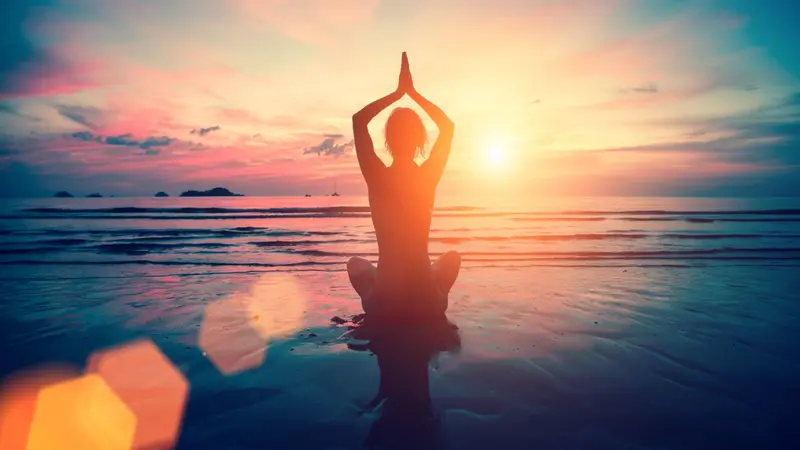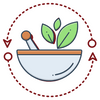

Complementary and Alternative Medicine (CAM)

Complementary and Alternative Medicine (CAM)
Fight Stress with the Relaxation Response
Stress is a physical and emotional reaction that people experience as they encounter challenges in life. When you’re under stress, your body reacts by releasing hormones that produce the “fight-or-flight” response. Your heart rate, breathing rate, and blood pressure go up, your muscles tense, and you sweat more. Occasional stress is a normal coping mechanism. However, long-term stress (also called chronic stress) may contribute to or worsen a range of health problems including digestive disorders, headaches, sleep disorders, and other symptoms. Stress may worsen asthma and has been linked to depression, anxiety, and other mental illnesses.
There is no drug to cure stress. But we do have access to a built-in “stress reset button.” It’s called the relaxation response. In contrast to the stress response, the relaxation response slows the heart rate, lowers blood pressure, and decreases oxygen consumption and levels of stress hormones.
Some people use psychological and physical approaches, such as yoga, mindfulness, or relaxation techniques, to release tension and to counteract the ill effects of stress.
Relaxation Techniques
Creating the relaxation response through the use of relaxation techniques can counteract the negative effects of stress. There is evidence that relaxation techniques can reduce blood pressure, inflammatory cytokines, and oxidative stress, as well as improve glycemic control in people with type 2 diabetes.
Relaxation techniques often combine breathing and focused attention on pleasing thoughts and images to calm the mind and the body. Some examples of relaxation techniques are autogenic training, biofeedback, deep breathing, guided imagery, progressive relaxation, and self-hypnosis.
Deep Breathing
Studies have shown that slow, deep breathing (also called diaphragmatic breathing) exercises may modestly lower blood pressure and reduce levels of cortisol (a main stress hormone in the body).
A 2019 review of three studies with a total of 880 participants, found preliminary evidence suggesting that diaphragmatic breathing exercises may help to reduce stress. Promising positive changes were seen in mental health self-evaluations and in certain physical measures, such as cortisol levels and blood pressure.
There is evidence that deep breathing reduces glycemia (the concentration of glucose or sugar in the blood) in people with type 2 diabetes, which may make it a useful addition to standard care for this condition.
Biofeedback
A 2018 review found that relaxation therapies and biofeedback might be helpful for reducing blood pressure, but only weak recommendations were made for their use because the quality of data from the 29 studies ranged from low to very low.
Several studies have looked at heart rate variability (HRV) biofeedback. One review of 24 studies involving a total of 484 participants found that HRV biofeedback is helpful for reducing self-reported stress and anxiety, and the researchers saw it as a promising approach with further development of wearable devices such as a fitness tracker.
Progressive Muscle Relaxation
Studies have shown that progressive muscle relaxation may produce stress-alleviating effects, as well as have a positive effect on anxiety and depression in some people.
A 2016 study showed that progressive muscle relaxation can decrease blood pressure during pregnancy.
Meditation and Mindfulness Practices
Mindfulness
Current scientific evidence suggests that mindfulness meditation—a practice that cultivates abilities to maintain focused and clear attention and develop increased awareness of the present—may help reduce symptoms of stress, including anxiety and depression, and may help improve sleep.
A 2022 study found that participants who practiced mindfulness had a significant reduction in perceived stress and anxiety levels, as well as an improved balance of some key mediators of inflammatory states.
A 2021 study conducted in university students found that mindfulness was associated with low levels of psychological distress and that a brief mindfulness-based intervention was useful to reduce distress measures in this population.
A 2019 review of 18 studies found moderately strong evidence that mindfulness meditation interventions significantly improved sleep quality in a variety of groups of people with sleep disturbances.
A 2018 review of scientific literature that examined mindfulness-based programs targeting workplace stress or work engagement found that mindfulness-based interventions may be a promising avenue for improving stress indicators in the body.
Meditation
A 2017 review of research on meditation and physiological markers of stress that included eight studies of focused attention meditation found that this type of meditation reduced blood pressure and cortisol levels.
Results of a 2009 NCCIH-funded trial involving 298 university students suggest that practicing Transcendental Meditation (TM) may lower the blood pressure of people at increased risk of developing high blood pressure. The findings also suggested that practicing meditation can help with psychological distress, anxiety, depression, anger/hostility, and coping ability.
A literature review and scientific statement from the American Heart Association suggest that evidence supports the use of TM to lower blood pressure. However, the review indicates that it’s uncertain whether TM is truly superior to other meditation techniques in terms of lowering blood pressure because there are few head-to-head studies.
Clinical practice guidelines issued in 2014 by the Society for Integrative Oncology recommend meditation as supportive care to reduce stress, anxiety, depression, and fatigue in patients treated for breast cancer. Stress management, yoga, massage, music therapy, energy conservation, and meditation are recommended for stress reduction, anxiety, depression, fatigue, and quality of life.
Yoga
Some but not all studies of yoga for stress management have shown improvements in physical or psychological measures related to stress.
A 2020 review of 12 studies of a variety of types of yoga for stress management in healthy adults found beneficial effects of yoga on measures of perceived stress.
Of 17 older studies of yoga for stress management included in a 2014 review, 12 showed improvements in physical or psychological measures related to stress.
A 2018 study involving 90 participants investigated the effects of 8- and 16-week gym yoga on stress and psychological health. The study found that when compared to the control group, those who practiced yoga showed significant decreases in stress and anxiety, improvements in general psychological health, and increases in well-being.
2017 clinical practice guidelines issued by the American Cancer Society on the evidence-based use of integrative therapies during and after breast cancer treatment recommend yoga for anxiety/stress reduction.
Safety
Meditation and mindfulness practices usually are considered to have few risks. However, few studies have examined these practices for potentially harmful effects, so it isn’t possible to make definite statements about safety.
Relaxation techniques are generally considered safe for healthy people. In most research studies, there have been no reported negative side effects. However, occasionally, people report negative experiences such as increased anxiety, intrusive thoughts, or fear of losing control.
There have been rare reports that certain relaxation techniques might cause or worsen symptoms in people with epilepsy or certain psychiatric conditions, or with a history of abuse or trauma.
Yoga is generally considered a safe form of physical activity for healthy people when performed properly, under the guidance of a qualified instructor. However, as with other forms of physical activity, injuries can occur. The most common injuries are sprains and strains, and the parts of the body most commonly injured are the knee or lower leg. Serious injuries are rare. The risk of injury associated with yoga is lower than that for higher impact physical activities.
If you have high blood pressure, it’s important to follow the treatment plan prescribed by your health care provider. Following your treatment plan is important because it can prevent or delay serious complications of high blood pressure. If you’re considering a complementary or integrative approach for your high blood pressure, discuss it with your health care provider.
You also may wish to check out KnoWEwell's webinar (live or on demand), Healthcare from Your Dentist's Chair: Adrenal Fatigue and the Brutality of Burnout, to learn more about the stress-related adrenal fatigue and the affect it has on your health. Click here to learn more and register.
REFERENCES
National Center for Complementary and Integrative Health. (2022, April). Stress. U.S. Department of Health and Human Services. National Institutes of Health. https://www.nccih.nih.gov/health/stress


 By
By



